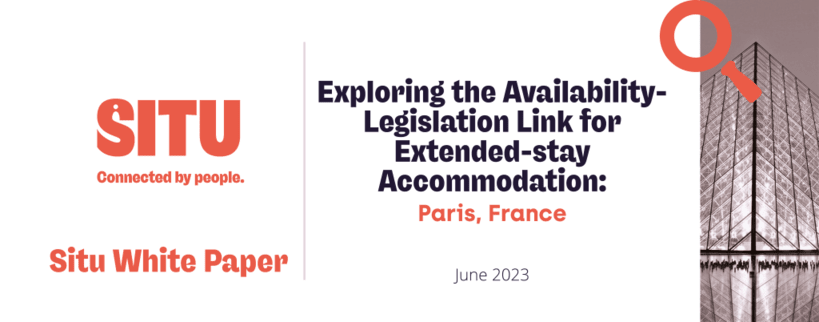In one of the most visited cities in the world, accommodation of all types for short and extended stays are at a premium. One of Situ’s partners, Matt Was, Head of Global Mobility at Blueground in Paris says, “At present, hotel capacity stands at 80,000 rooms, which is relatively low for a city of our size and the number-one tourist destination worldwide.”

Upcoming events such as the Rugby World Cup 2023 and next year’s summer Paris Olympics will cause a sharp peak in demand, as Guillaume Gerard, Head of European Corporate Sales at Adagio City Paris confirms. Guillaume also notes that, “Aparthotels have been put in the spotlight thanks to the pandemic: since travel re-started we have been very busy…it is more and more difficult to find availability, especially in Paris.”
Marie-Pierre Michelet, Sales Manager of My Flat in Paris, also notes that last-minute requests for accommodation increased due to people leaving Ukraine because of the war.
Paris has some of the highest numbers in terms of listings on digital booking platforms and as a response has put in place new rules and regulatory tools. These were challenged, but recently the country’s highest court has upheld regulations to restrict short-term rentals in the city. 1
The authorities aim to differentiate between hosts who are renting their properties out on a non-professional basis, and those who are on these platforms as a business. Every property in Paris offering short-term rental must now register with Paris City Hall; but there are different rules for those renting temporary housing exclusively to companies for between one and ten months. Hotels and other commercial properties eligible for short-term stays have a different status and can be booked on a per-night basis.
There is a cap of 120 days a year on a primary residence rented through a home sharing platform. Owners must register for tax. Those renting out through digital platforms must request a registration number through Paris City Hall and display it on their listing; not doing so risks a fine of 5000 Euros. In addition, where the use of a property is changed, such as a second homeowner changing the use of their property to short-term lettings via planning, a commercial and residential property of the same size must be bought and made into a residential property as compensation.
Such iconic cities, popular for both leisure travel and business often have housing problems. In Venice, it has just been confirmed that short-term rentals are also being capped at 120 days a year to dissuade residents from renting out their homes and leaving, as the city’s population has fallen to 50,000 from a high of 150,000 2. The counter argument this is that city dwellers often live in their properties while renting them out, allowing them to continue living in the city, and keeping its local amenities, and tourism alive.
In Paris, as in many cities, the regulations to address short-term rentals are likely to add to existing pressure on accommodation from the large number of tourists and business travellers travelling to one of the world’s most visited destinations.
Access White PaperDo you need a stay in Paris? Do browse our selection of great Situ serviced apartments in Paris, or pick up the phone and give one of our friendly accommodation specialists a call at +44 (0)1392 690 079.


